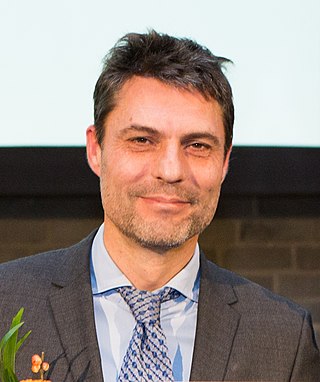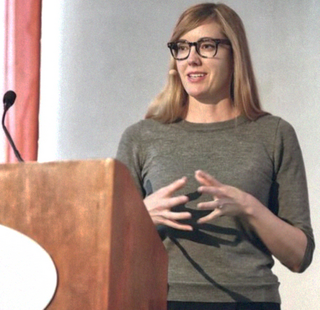
Innovation is the practical implementation of ideas that result in the introduction of new goods or services or improvement in offering goods or services. ISO TC 279 in the standard ISO 56000:2020 defines innovation as "a new or changed entity realizing or redistributing value". Others have different definitions; a common element in the definitions is a focus on newness, improvement, and spread of ideas or technologies.

Creativity is a characteristic of someone or some process that forms something new and valuable. The created item may be intangible or a physical object.
Bertram Gawronski is a social psychologist and professor of psychology at the University of Texas at Austin. He is known for his research in the areas of attitudes, social cognition, decision making, and moral psychology.
Innovation leadership is a philosophy and technique that combines different leadership styles to influence employees to produce creative ideas, products, and services. The key role in the practice of innovation leadership is the innovation leader. Dr. David Gliddon (2006) developed the competency model of innovation leaders and established the concept of innovation leadership at Penn State University.
Psychological safety is the belief that one will not be punished or humiliated for speaking up with ideas, questions, concerns, or mistakes. In teams, it refers to team members believing that they can take risks without being shamed by other team members. In psychologically safe teams, team members feel accepted and respected. It is also the most studied enabling condition in group dynamics and team learning research.
Marino (Min) Sidney Basadur is a teacher, consultant and researcher best known for his work in applied creativity and as the developer Simplexity Thinking System for improving workplace innovation & creativity. He is president of Basadur Applied Creativity and professor emeritus of organizational behavior and innovation at McMaster University's Michael G. DeGroote School of Business.

Naomi Ellemers is a distinguished professor of social psychology at Utrecht University since September 2015.

Carsten Karel Willem de Dreu is a Professor of Psychology at Leiden University and previously Behavioral Economics at the University of Amsterdam. He is member of the Royal Netherlands Academy of Arts and Sciences. De Dreu received his PhD in social and organizational psychology from the University of Groningen (1993) and was president of the European Association of Social Psychology and the International Association for Conflict Management. In 2016 he was named Distinguished Research Fellow at the University of Oxford.
Judith E. Glaser was an American author, academic, business executive, and organizational anthropologist. She was the founder and chief executive officer of Benchmark Communications, Inc., an executive coaching and management consulting company based in New York City and Boston. Glaser was also the co-founder and chairman of the Creating WE Institute. During her career, she worked with clients including Clairol, Citibank, Pfizer, Burberry, American Airlines, and Verizon.
Nilanjana Dasgupta is a social psychologist whose work focuses on the effects of social contexts on implicit stereotypes - particularly on factors that insulate women in STEM fields from harmful stereotypes which suggest that females perform poorly in such areas. Dasgupta is a professor of Psychology and is the Director of the Institute of Diversity Sciences and the University of Massachusetts, Amherst.

Jennifer A. Chatman is an American academic who is the Associate Dean for Academic Affairs and the Paul J. Cortese Distinguished Professor of Management at the Haas School of Business, University of California, Berkeley. Chatman is also the Co-Director of the Berkeley Haas Culture Initiative, the Assistant Dean for Learning Strategies at the Haas School of Business, and Editor for the journal Research in Organizational Behavior.

Kay Deaux is an American social psychologist known for her pioneering research on immigration and feminist identity. Deaux is Distinguished Professor Emerita at the Department of Psychology at the Graduate Center of the City University of New York (CUNY). According to Brenda Major, Deaux's work centers on the question of how social categories affect one's psychological makeup, social behavior, and life outcomes, while emphasizing the subjectivity of people's identities and experiences and the larger social context.
Team diversity refers to the differences between individual members of a team that can exist on various dimensions like age, nationality, religious background, functional background or task skills, sexual orientation, and political preferences, among others. Different types of diversity include demographic, personality and functional diversity, and can have positive as well as negative effects on team outcomes. Diversity can impact performance, team member satisfaction or the innovative capacity of a team. According to the Input-Process-Output Model, team diversity is considered an input factor that has effects on the processes as well as on the team outputs of team work.
Sandra L. Murray is Professor of Psychology at the University at Buffalo, State University of New York. She is a social psychologist known for her work on close relationships and their trajectories over time. Murray received the American Psychological Association Award for Distinguished Scientific Early Career Contributions to Psychology in 2003 for "distinguished and original contributions to an understanding of motivated social cognition in relationships." Other awards include the New Contribution Award from the International Society for the Study of Personal Relationships in 1998 and 2000, the Outstanding Early Career Award from the International Society for Self and Identity in 2000, the Career Trajectory Award from the Society of Experimental Social Psychology in 2012, the Mid-Career Distinguished Contribution Award from the International Association for Relationship Research in 2016, and the SUNY Chancellor's Award for Excellence in Scholarship and Creative Activities in 2020.

Leigh Thompson is the J. Jay Gerber Professor of Dispute Resolution & Organizations in the Kellogg School of Management at Northwestern University. She is the director of High Performance Negotiation Skills Executive program, the Kellogg Leading High Impact Teams Executive program and the Kellogg Team and Group Research Center. She also serves as the co-director of the Navigating Work Place Conflict Executive program and the Constructive Collaboration Executive program.
Abigail Marsh is a psychologist and neuroscientist who works as a professor at Georgetown University's Department of Psychology and the Interdisciplinary Neuroscience Program, where she is the director of the Laboratory on Social and Affective Neuroscience.

Beth Ames Altringer is an American designer and academic in user-centered design and design education. She is the director of the Master of Arts in Design Engineering program at Brown University and the Rhode Island School of Design. Altringer previously ran the Design Lab at Harvard University and taught design and innovation at the Harvard John A. Paulson School of Engineering and Applied Sciences, Harvard Graduate School of Design, and Harvard Business School.

Modupe Nyikoale Akinola is an American organizational scholar and social psychologist who examines the science of stress, creativity, and how to maximize human potential in diverse organizations. She is currently the Barbara and David Zalaznick Professor of Business at Columbia Business School, where she is the Director of the Sanford C. Bernstein & Co. Center for Leadership and Ethics.
Sherry Jueyu Wu is an Assistant Professor of Management and Organizational Behavior at the University of California, Los Angeles (UCLA) Anderson School of Management. in Westwood, California and the 2020 recipient of the Cialdini Prize from the Society for Personality and Social Psychology (SPSP) for her field research in group dynamics and authority. She conducts large-scale field experiments concerning group influence over long-lasting behavioral changes and decision processes under resource disparity and social inequality.
Jin Nam Choi is a Korean organizational psychologist, researcher, author, and academic. He is a professor of Organizational Behavior and Human Resource Management at the Graduate School of Business of Seoul National University.








